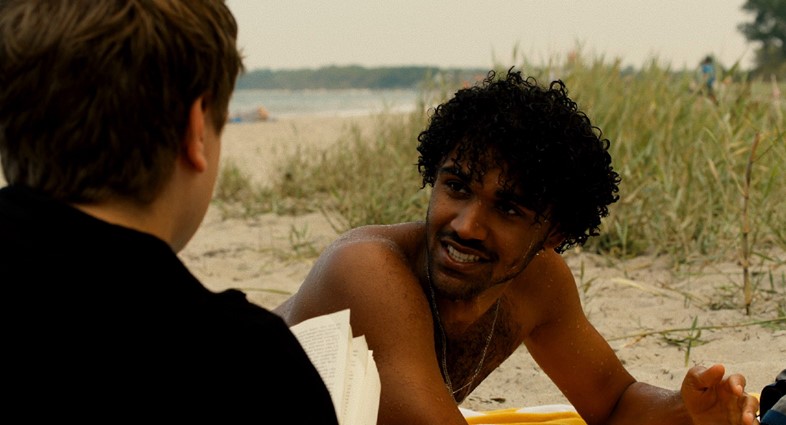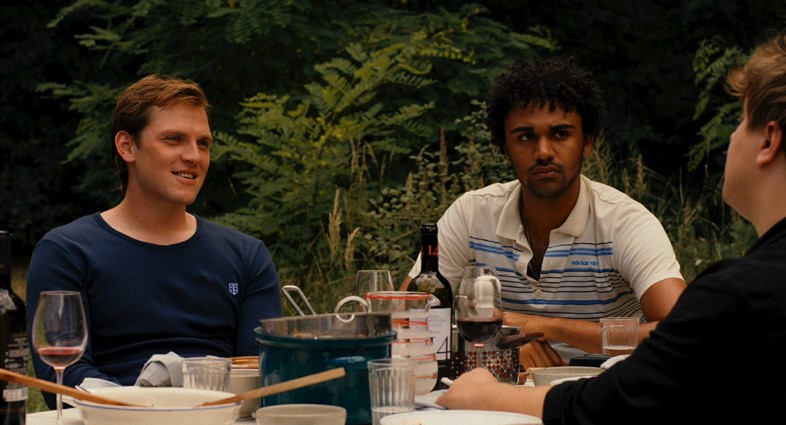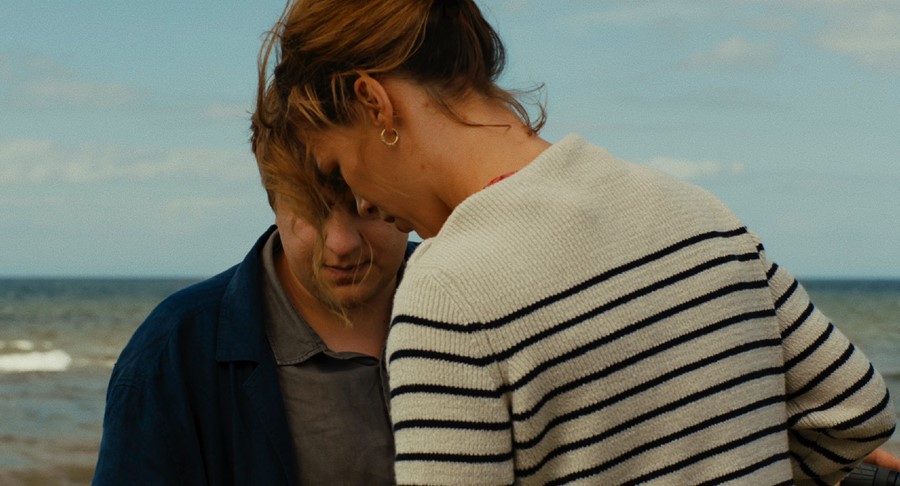“I wanted to make a movie about summer, life, complexity, passion, desire,” says German director Christian Petzold of his dreamy new feature, Afire
When I spoke to Christian Petzold for Undine in 2021, he described how his next film would be The Happy Ones, a forest-set romance based on his X-rated Covid hallucinations. “I lied,” the 62-year-old German auteur admits in August 2023. “My fever dreams were really boring. They weren’t sexual. They were nothing.”
Otherwise, the ensemble drama Petzold imagined while ill in bed is what became Afire, the new title for The Happy Ones. A dreamy, cutting comedy that satirises self-serious male novelists, Petzold’s fifteenth and possibly best feature to date unfolds in a holiday home by the German coast where no one really writes, they just pretend to. A newly published author, Leon (Thomas Schubert), and his photographer friend, Felix (Langston Uibel), arrive with plans for productivity that are knocked aside by their housemate, Nadja (Paula Beer), inarguably the happier one – for the first few days, she’s never seen, only heard at night audibly having sex through thin bedroom walls.
Afire marks Petzold’s third film in a row with Beer after Transit and Undine, and continues his slow, steady rise in reputation as one of the most thrilling directors working today. Prior to casting Beer, the director was also known for his six collaborations with Nina Hoss, including Barbara, Phoenix, and Yella. Notably, a recent New York Times headline ran: “Christian Petzold May Be the Best German Filmmaker You’ve Never Heard Of”. The director smiles when reminded of it. “In Berlin, they hate famous people,” he remarks. “And if they say I’m a good filmmaker, then it’s the best thing that could happen to me.”
Afire is what Petzold refers to as a “summer film”, the kind he watched during lockdown when he was, in his words, like Emily Brontë, in bed, on a voyage in his own mind. “I wanted to make a movie about summer, life, complexity, passion, desire,” he explains. “I started watching Éric Rohmer again. In Summer, the male subjects pretend to be weak, and say, ‘We’re not toxic anymore,’ but they have the power. La Collectionneuse is also about two guys in a house near the sea, and a girl they want to fuck who’s always reading, and when she leaves, they realise they don’t know anything.”
Before the interview, Petzold examined his notebook for the handwritten outline he penned in bed. In it, he jotted down the screenplay’s scenes, including the genre-y opening in which Leon and Felix momentarily seem to be entering a Saw movie. “I wrote this sentence: ‘The house is waiting for them.’ The complexity of the world is there, and they have to get a relationship to it. It’s not the world relating to them.” The director laughs. “These are the questions I wrote down during my Covid infection.”
The key gag of Afire, though, is that Leon, an artist whose profession involves observing the world, is a shut-in, preferring isolation with his laptop. Instead, Nadja lives a complete life, both during the day and in the evenings, while Felix shares, with Nadja, a sexual partner in the form of a hunky lifeguard, Devid (Enno Trebs). In fact, Leon is so unobservant, he wasn’t aware of his best friend’s bisexuality, and the one time Leon treats himself to a beach visit, he’s the dullard who doesn’t swim.

“When you can’t impress the world with good things, you try to impress the world with mean things,” says Petzold. “When I was Leon’s age, me and my friends were invited to Milan. We had parties, and tickets for a Talking Heads concert. We came to this place, and the group were so full of enthusiasm, saying we would go out dancing. And I said, ‘No, I have to work.’ Why? We were in Italy with fantastic food, Talking Heads, and so on. But I said, ‘No, I have to write an essay. You can go.’ But when they left the apartment, I couldn’t do it. I watched TV the whole night. I just wanted to impress them, that I was a Protestant-ethic guy who had no time to party because I’m working on my career. So I know many things about guys like Leon, from my own biography.”
Is it a male characteristic? “It’s totally male. When you have a party in Berlin, there’s dancing in the living room, and, in the kitchen, it’s mostly male artists and philosophers without any career – they’re talking, talking, talking. They think they’re impressing the beautiful girls and handsome boys in the living room, but the dancers ignore them. The dancers lose control in a structured way, but the guys in the kitchen fear it. I was part of the Kitchen Society when I was young.” He laughs. “Until today, sometimes.”
In contrast, Nadja constantly cycles everywhere, much to Leon’s private envy. Is it better to be on a bike than to be part of the Kitchen Society? “For me, a bicycle is freedom,” says Petzold. “Someone on a bicycle is an individual, on air. They don’t need petrol. They’re inside nature.” Behind me, on a Zoom virtual background, is a montage of cycling scenes throughout Petzold’s filmography, several with Hoss, but none with Franz Rogowski, an actor Petzold more or less made famous. It thus feels odd that Rogowski cycles throughout Ira Sachs’ Passages, not Transit or Undine.
“On Transit, in Marseille, we’d go by car to shoot a scene, and Franz was faster than us on this special bicycle for velodromes without brakes. If the insurance company knew Franz was driving it, it would’ve been a scandal. A bicycle movie with Franz Rogowski would be great but you need a love story.” What about one with Beer? “I can’t do a third movie with them together now. I have to wait two or three years. Perhaps I’ll make a film where they have an accident on their bicycles together, and they meet for the first time. That could be great?”

Afire was supposed to be the third of four films in which Petzold explores the elements. The first, Undine, tackled water, and the intended second entry – an earth-related adaptation of Georges Simenon’s Dirty Snow – was scrapped for being too dystopian in already dystopian times. Yet despite the forest fires and its title, Afire is equally concerned with water. Thus even if Afire is a wordy drama – it revolves around a stoic writer of prose, and includes Nadja reciting Heinrich Heine’s The Asra – its real poetry emerges from the burgeoning flames that represent romantic passion, global warming, or both, and the evocative shots of the Baltic Coast, the hypnotic waves speaking more with their movements than Leon’s floundering attempt to profess his love to Nadja.
Could it also be that, as a novelist, Leon struggles to lose himself in the moment, and thus imagines all real-life situations not just as material, but in the third person, as if he’s writing for a character? “In cinema history, writers destroy their love letters, because they can’t find the words,” says Petzold. “I like that, in the scene, Leon is stuttering. He’s lost control. Between the words are his emotions. Therefore I believe him, but it’s too late. That’s his problem. All the guys from the Kitchen Society, they’re always too late.”
Afire is out in UK cinemas now and is available to stream on Curzon Home Cinema.
